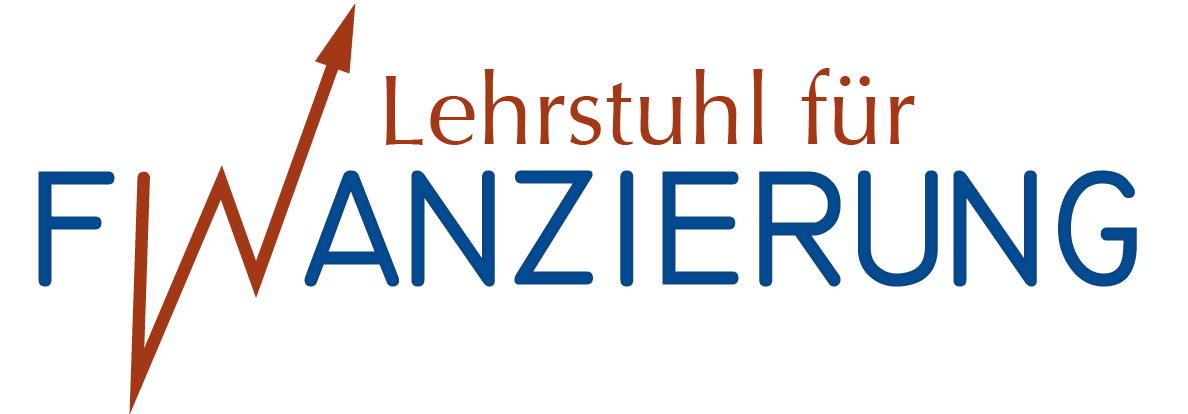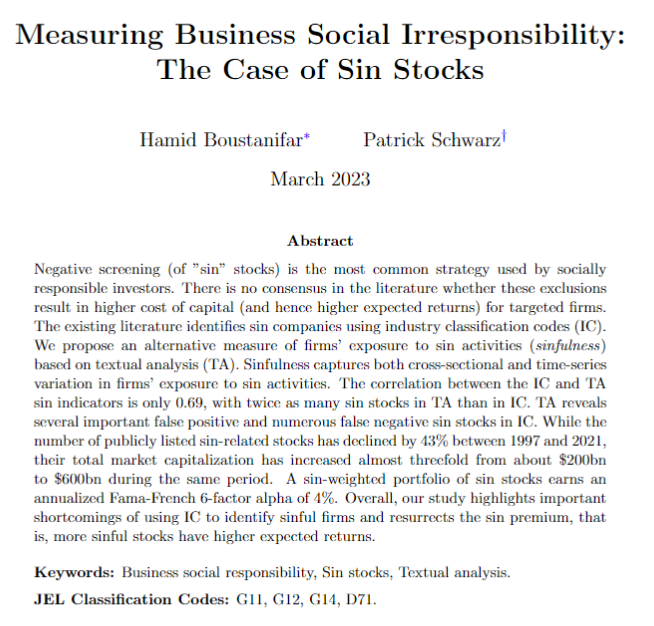Team

Academic Staff
Dr. Patrick Schwarz
- Room:
- R11 T07 D21
- Phone:
- +49 201 18-34024
- Email:
- patrick.schwarz (at) uni-due.de
- Consultation Hour:
- by appointment
- Homepage:
- www.patrick-schwarz.finance
- Social Media:
- @datrickf
Curriculum Vitae:
Education:
- 2018 - 2024: Finance Ph.D. (Dr. rer. pol.) at the Chair of Finance at the University Duisburg-Essen, Campus Essen
- 2015 - 2018: Business Administration (M.Sc.) at the Heinrich-Heine University Düsseldorf
- 2011 - 2014: Business Administration (B.Sc.) at the Heinrich-Heine University Düsseldorf
Working experience:
- 2018 - 2024: Research Assistant at the Chair of Finance at the University Duisburg-Essen, Campus Essen
- 2019 - 2020: University Lecturer at the FOM University of Applied Sciences Essen
- 2017 - 2018: Student Assistant at the Chair of Business Administration, Entrepreneurship and Finance at the Heinrich-Heine University Düsseldorf
- 2014 - 2015: Professional at Deloitte & Touche Wirtschaftsprüfungsgesellschaft GmbH, Tax & Legal – Private Company Services
Fields of Research:
- Empirical Capital Market Research, Asset Management, Asset Pricing, Anomalies and Market Efficiency.
Publications:
Abstract
We propose a simple approach to synthesize presumably information-driven insider trading signals for the cross-section of stocks. We find that the resulting composite strategy can predict returns, predominantly in equal-weighted portfolios, in our global sample. The results indicate that the benefits of our composite strategy reflect a short-term informational advantage of insiders. Finally, cross-country analysis reveals that varying insider trading restrictions between countries have limited explanatory power for the benefits of the composite strategy.
Abstract
Negative screening (of "sin" stocks) is the most common strategy used by socially responsible investors. There is no consensus in the literature whether these exclusions result in higher cost of capital (and hence higher expected returns) for targeted firms. The existing literature identifies sin companies using industry classification codes (IC). We propose an alternative measure of firms' exposure to sin activities (sinfulness) based on textual analysis (TA). Sinfulness captures both cross-sectional and time-series variation in firms' exposure to sin activities. The correlation between the IC and TA sin indicators is only 0.69, with twice as many sin stocks in TA than in IC. TA reveals several important false positive and numerous false negative sin stocks in IC. While the number of publicly listed sin-related stocks has declined by 43% between 1997 and 2021, their total market capitalization has increased almost threefold from about $200bn to $600bn during the same period. A sin-weighted portfolio of sin stocks earns an annualized Fama-French 6-factor alpha of 4%. Overall, our study highlights important shortcomings of using IC to identify sinful firms and resurrects the sin premium, that is, more sinful stocks have higher expected returns.
Abstract
Motivated by the mixed evidence on the performance of (downside) volatility-managed equity factor portfolios in the U.S., I study the performance of nine (downside) volatility-managed equity factors before and after considering transaction costs in a set of 45 international equity markets. My results suggest that volatility management is most promising for market, value, profitability, and momentum portfolios and that the performance can be enhanced by applying downside volatility instead of total volatility (variance) as a scaling factor. Nevertheless, a marginal trader would find it difficult to profit from these strategies as only the managed market and momentum strategies are partially robust to my transaction cost estimations. Collectively, my results suggest that the persistence of abnormal returns of (downside) volatility-managed equity factors can largely be explained by the associated transaction costs. Finally, my cross-country analysis suggests that the slow trading hypothesis is partially able to explain cross-country performance differences of volatility-managed value and momentum portfolios.
Talks:
- Schwarz, Patrick: Measuring Business Social Irresponsibility: The Case of Sin Stocks, 21th EUROFIDAI-ESSEC Paris December Finance Meeting (PDFM), 19.12.2023, Paris, FRA. AbstractDetails
Negative screening (of "sin" stocks) is the most common strategy used by socially responsible investors. There is no consensus in the literature whether these exclusions result in higher cost of capital (and hence higher expected returns) for targeted firms. The existing literature identifies sin companies using industry classification codes (IC). We propose an alternative measure of firms' exposure to sin activities (sinfulness) based on textual analysis (TA) of their annual reports. Sinfulness captures both cross-sectional and time-series variation in firms' exposure to sin activities. The correlation between the IC and TA sin indicators is only 0.69, with twice as many sin stocks in TA than in IC. TA reveals several important false positive and numerous false negative sin stocks in IC. While the number of publicly listed sin-related stocks has declined by 43% between 1997 and 2021, their total market capitalization has increased almost threefold from about $200bn to $600bn during the same period. A sin-weighted portfolio of sin stocks earns an annualized Fama-French 6-factor alpha of 4%. Overall, our study highlights important shortcomings of using IC to identify sinful firms and resurrects the sin premium, that is, more sinful stocks have higher expected returns.
- Schwarz, Patrick: Measuring Business Social Irresponsibility: The Case of Sin Stocks, 29th Annual Meeting of the German Finance Association (DGF), 29.09.2023, Hohenheim, GER. AbstractDetails
Negative screening (of "sin" stocks) is the most common strategy used by socially responsible investors. There is no consensus in the literature whether these exclusions result in higher cost of capital (and hence higher expected returns) for targeted firms. The existing literature identifies sin companies using industry classification codes (IC). We propose an alternative measure of firms' exposure to sin activities (sinfulness) based on textual analysis (TA) of their annual reports. Sinfulness captures both cross-sectional and time-series variation in firms' exposure to sin activities. The correlation between the IC and TA sin indicators is only 0.69, with twice as many sin stocks in TA than in IC. TA reveals several important false positive and numerous false negative sin stocks in IC. While the number of publicly listed sin-related stocks has declined by 43% between 1997 and 2021, their total market capitalization has increased almost threefold from about $200bn to $600bn during the same period. A sin-weighted portfolio of sin stocks earns an annualized Fama-French 6-factor alpha of 4%. Overall, our study highlights important shortcomings of using IC to identify sinful firms and resurrects the sin premium, that is, more sinful stocks have higher expected returns.
- Schwarz, Patrick: Measuring Business Social Irresponsibility: The Case of Sin Stocks, 20th Annual Corporate Finance Days (CFD), 21.09.2023, IÉSEG, Lille, FRA. AbstractDetails
Negative screening (of "sin" stocks) is the most common strategy used by socially responsible investors. There is no consensus in the literature whether these exclusions result in higher cost of capital (and hence higher expected returns) for targeted firms. The existing literature identifies sin companies using industry classification codes (IC). We propose an alternative measure of firms' exposure to sin activities (sinfulness) based on textual analysis (TA) of their annual reports. Sinfulness captures both cross-sectional and time-series variation in firms' exposure to sin activities. The correlation between the IC and TA sin indicators is only 0.69, with twice as many sin stocks in TA than in IC. TA reveals several important false positive and numerous false negative sin stocks in IC. While the number of publicly listed sin-related stocks has declined by 43% between 1997 and 2021, their total market capitalization has increased almost threefold from about $200bn to $600bn during the same period. A sin-weighted portfolio of sin stocks earns an annualized Fama-French 6-factor alpha of 4%. Overall, our study highlights important shortcomings of using IC to identify sinful firms and resurrects the sin premium, that is, more sinful stocks have higher expected returns.
- Schwarz, Patrick: Measuring Business Social Irresponsibility: The Case of Sin Stocks, 6th Annual Conference of the Global Research Alliance on Sustainable Finance and Investment (GRASFI), 23.08.2023, Yale University, New Haven, US. AbstractDetails
Negative screening (of "sin" stocks) is the most common strategy used by socially responsible investors. There is no consensus in the literature whether these exclusions result in higher cost of capital (and hence higher expected returns) for targeted firms. The existing literature identifies sin companies using industry classification codes (IC). We propose an alternative measure of firms' exposure to sin activities (sinfulness) based on textual analysis (TA) of their annual reports. Sinfulness captures both cross-sectional and time-series variation in firms' exposure to sin activities. The correlation between the IC and TA sin indicators is only 0.69, with twice as many sin stocks in TA than in IC. TA reveals several important false positive and numerous false negative sin stocks in IC. While the number of publicly listed sin-related stocks has declined by 43% between 1997 and 2021, their total market capitalization has increased almost threefold from about $200bn to $600bn during the same period. A sin-weighted portfolio of sin stocks earns an annualized Fama-French 6-factor alpha of 4%. Overall, our study highlights important shortcomings of using IC to identify sinful firms and resurrects the sin premium, that is, more sinful stocks have higher expected returns.
Motivated by the mixed evidence on the performance of (downside) volatility-managed equity factor portfolios in the U.S., I study the performance of nine (downside) volatility-managed equity factors before and after considering transaction costs in a set of 45 international equity markets. My results suggest that volatility management is most promising for market, value, profitability and momentum portfolios and that the performance can be enhanced by applying downside volatility instead of total volatility (variance) as a scaling factor. Nevertheless, a marginal trader would find it difficult to profit from these strategies as only the managed market and momentum strategies are partially robust to my transaction cost estimations. Collectively, my results suggest that the persistence of abnormal returns of (downside) volatility-managed equity factors can largely be explained by the associated transaction costs.
Motivated by the mixed evidence on the performance of (downside) volatility-managed equity factor portfolios in the U.S., I study the performance of nine (downside) volatility-managed equity factors before and after considering transaction costs in a set of 45 international equity markets. My results suggest that volatility management is most promising for market, value, profitability and momentum portfolios and that the performance can be enhanced by applying downside volatility instead of total volatility (variance) as a scaling factor. Nevertheless, a marginal trader would find it difficult to profit from these strategies as only the managed market and momentum strategies are partially robust to my transaction cost estimations. Collectively, my results suggest that the persistence of abnormal returns of (downside) volatility-managed equity factors can largely be explained by the associated transaction costs.
Courses:
- ST 24: Exercise "Asset Management" (Bachelor); Finance Seminar "Hedgefonds" (Bachelor)
- WT 23/24: Exercise "Corporate Finance" (Master); Finance Seminar "Insider Trading" (Bachelor) & "Short-Selling in the European stock market" (Master)
- ST 23: Exercise "Asset Management" (Bachelor); Finance Seminar "Textual Analysis in Finance" (Bachelor)
- WT 22/23: Exercise "Corporate Finance" (Master); Finance Seminar "Short Selling" (Bachelor) & "European Mutual Fund Flows" (Master)
- WT 21/22: Exercise "Corporate Finance" (Master); Finance Seminar "Bubbles and crashes" (Bachelor) & "Trading costs" (Master)
- ST 21: Exercise "Asset Management" (Bachelor); Finance Seminar "Long-term investment decisions" (Bachelor)
- WT 20/21: Exercise "Corporate Finance" (Master); Finance Seminar "Dividend policy" (Bachelor) & "European Mutua Fund Performance" (Master)
- ST 20: Lecture and Exercise "Asset Management" (Bachelor)
- WT:19/20: Exercise "Corporate Finance" (Master); Finance Seminar "Investor Sentiment"
- ST 19: Exercise "Asset Management" (Bachelor); Finance Seminar "Behavioral Corporate Finance"
- WT 18/19: Exercise "Corporate Finance" (Master); Finance Seminar "Asset Management"
Memberships:
- German Finance Association (DGF) e.V.
- European Finance Association (EFA)
- American Finance Association (AFA)
Academic Duties:
- Board member of the House of Energy Markets and Finance







